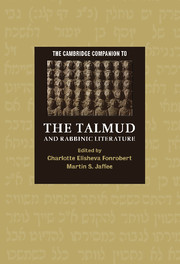Book contents
- Frontmatter
- Introduction: The Talmud, Rabbinic Literature, and Jewish Culture
- Part I: The Conditions of Rabbinic Literary Activity
- Part II: The Genres of Rabbinic Literary Composition
- 5 Rabbinic Midrash and Ancient Jewish Biblical Interpretation
- 6 The Judaean Legal Tradition and the Halakhah of the Mishnah
- 7 Roman Law and Rabbinic Legal Composition
- 8 Middle Persian Culture and Babylonian Sages: Accommodation and Resistance in the Shaping of Rabbinic Legal Tradition
- 9 Jewish Visionary Tradition in Rabbinic Literature
- 10 An Almost Invisible Presence: Multilingual Puns in Rabbinic Literature
- Part III: Hermeneutical Frames for Interpreting Rabbinic Literature
- Bibliography
- Index
- Source Index
- Series List
7 - Roman Law and Rabbinic Legal Composition
from Part II: - The Genres of Rabbinic Literary Composition
Published online by Cambridge University Press: 28 November 2007
- Frontmatter
- Introduction: The Talmud, Rabbinic Literature, and Jewish Culture
- Part I: The Conditions of Rabbinic Literary Activity
- Part II: The Genres of Rabbinic Literary Composition
- 5 Rabbinic Midrash and Ancient Jewish Biblical Interpretation
- 6 The Judaean Legal Tradition and the Halakhah of the Mishnah
- 7 Roman Law and Rabbinic Legal Composition
- 8 Middle Persian Culture and Babylonian Sages: Accommodation and Resistance in the Shaping of Rabbinic Legal Tradition
- 9 Jewish Visionary Tradition in Rabbinic Literature
- 10 An Almost Invisible Presence: Multilingual Puns in Rabbinic Literature
- Part III: Hermeneutical Frames for Interpreting Rabbinic Literature
- Bibliography
- Index
- Source Index
- Series List
Summary
The discussion of legal issues and the creation and application of legal rulings was one of the main activities of both rabbis and Roman legal experts in Late Antiquity. In the course of this process, rabbis and jurists often dealt with similar topics, encountered similar problems, presented similar answers, and used similar literary forms to transmit their traditions to later generations. It is tempting to argue that such similarities concerning the form and/or content of their teachings point to direct influence of one set of scholars on the other. This is a temptation we should resist. Such tempting parallels need to be understood against the background of the rabbis' participation in a Late Antique cultural context dominated by Greco-Roman culture.
A comparative legal approach is interested in both similarities and differences in legal theory and practice. Similarities may point to shared social structures and moral concerns. Although rabbis and Roman jurists shared the Late Antique cultural context, their legal teachings were also based on their particular cultural heritages, the Hebrew Bible and ancient Roman legal traditions, respectively. When examining differences, legal scholars' indebtedness to these earlier bodies of material have to be taken into consideration as well.
- Type
- Chapter
- Information
- The Cambridge Companion to the Talmud and Rabbinic Literature , pp. 144 - 164Publisher: Cambridge University PressPrint publication year: 2007
- 4
- Cited by



